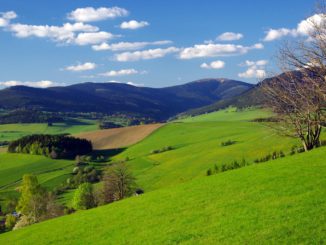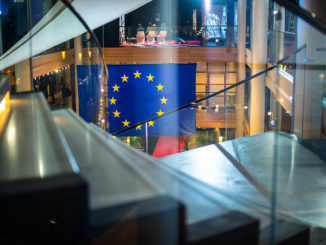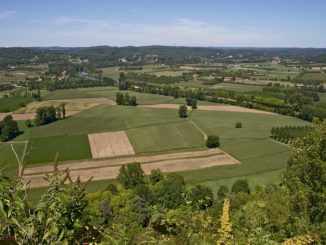It remains unclear how EU-member states with powerful dairy industries will take into account the interests of farming communities outside Europe. While the instruments of which the CAP is comprised focus on the primary production inside the EU, impacts are felt within countries, in Europe and further afield.
Hans Wetzels
FrieslandCampina is a dairy powerhouse in its own right. In 2019 the Dutch cooperation is collectively owned by 17.413 livestock farmers in the Netherlands, Germany and Belgium and achieved a net turnover of 11 billion euro in 2019. Through operations in 36 countries FrieslandCampina sells its products and brands on markets in over 100 countries.
In the next decade the Dutch cooperative wants to become a market leader globally when it comes to sustainable dairy products and works in close cooperation with the government of the Netherlands securing export markets. According to research by the prestigious Wageningen University, Nigeria is the largest African importer of dairy, has the biggest African city within its borders, and has a up and coming middle class. Up to 98 percent of all dairy in Nigeria is imported – and no less than 75 percent of that is controlled by the FrieslandCampina subsidiary WAMCO.
According to data European Milk Board (EMB) data, FrieslandCampina buys milk from around 85 percent of Dutch dairy farms. Supported the abolition of the milk quota, this has resulted in over-supply and depressed prices.
In a 2020 report about lobbying around the proposals for a new Common Agricultural Policy (CAP), the Brussels-based research group Corporate Europe Observatory (CEO) reported on a 2018 documentary feature, whereby Dutch as well as German farmers were convinced that China would buy up surpluses after quota had disappeared (See below)
Failure of that promise to materialize, the corona-pandemic undercutting demand worldwide, the closing of the Hong Kong border cutting European dairy exporters off from Chinese consumer markets and low oil prices making it more expensive for FrieslandCampina to import dairy into Nigeria and from there reach markets in Western Africa, has compounded the problems. In a Dutch newspaper, FrieslandCampina executives also warned that they foresee a further decrease in livestock farms in the Netherlands due to ‘lack of good future prospects’.
Civil dialogue
In Brussels, legislative responsibility concerning the CAP lies with the directorate-general (DG) AGRI of the European Commission. DG AGRI regularly hosts civil dialogue groups in order to assess policy demands by relevant actors in agriculture.
Those meetings are however heavily dominated by status quo interests, CEO reports. The participant list of a February 2019 ‘stocktaking meeting’ in Brussels revealed a disbalance of power heavily in favour of groups usually advocating for market-oriented policies stimulating exports, filling the consultation meeting with presentations by banks and supermarkets.
Since legislative responsibilities for the CAP will be shifting from the European Commission to EU member states, national governments are busy drafting National Strategic Plans to outline how the CAP will be implemented inside their territories. Although much remains unclear – countries like the Netherlands or Germany, sporting heavily efficient, export-oriented and CAP-subsidized, agricultural sectors, world trade seems to remains a crucial policy goal.
In the concept SWOT-analysis (September 2019) commissioned by the Dutch ministry of Agriculture (LNV – Landbouw, Natuur & Voedselkwaliteit) a team of researchers from Wageningen University concludes that: ‘Access to international markets is important for the Dutch agri sector. Markets in the Netherlands are too small for the ambitions most companies have, and who market their produce – varying from seeds to slaughter lines and cheese – outside the Netherlands.’
In an analysis of ambition on the new CAP (2021-2027) presented by the German Presidency of the EU in the second half of 2020 professor Alan Matthews of Trinity College Dublin concludes that Berlin seems to be pursuing the ‘lowest common denominator’ concerning the agricultural sustainability ambitions to European Commission has set out in its landmark Green Deal. Inside Germany the focus remains on export efficiency as well.
Farmers’ association ABL (Arbeitsgemeinschaft bäuerliche Landwirtschaft e.V.) in a letter (dated July 22, 2020) responds to the request for policy inputs by the German Agricultural ministry (BMEL – Bundesministerium für Ernährung und Landwirtschaft) concerning the German CAP National Strategic Plan (CAP-NSP). ABL calls it ‘incomprehensible’ that Green Deal-related sustainability strategies did not materialize into any concrete goals or measures in the forthcoming German policy proposals, and no measures at all are foreseen to stabilize milk markets. The ‘biggest weakness of analysis’ of the German policy proposals is ‘that the decade long export orientation of the European and German agricultural economy and the connected specialization and rationalization of agrarian companies’ is never critically examined, ABL writes.
Nationalization
In recent years, a proposed boost in German dairy-exports already has come under heavy criticism for the potential economic damage it could do in the developing world. Now the plan of the European Commission to redirect CAP-implementation to national governments through the formulation of National Strategic Plans (CAP-NSP) could worsen the focus on increasing exports – especially in times of crisis and upheaval.
European Coordination Via Campesina (ECVC) warns: ‘this entails a serious fragmentation of the policy. It also represents a setback in achieving its objective of cohesion. The European Commission refuses to direct agriculture towards sustainable and long-lasting agricultural models that ensure local, high-quality food, preserve the environment, boost the rural economy everywhere and guarantee a decent wage for all farmers. (…) This plan will push for over-investment, farm expansion and simplification of ever more advanced practices.’
The Netherlands are planning to finalize their CAP-NSP by the end of 2021. Negotiations are coordinated between the Dutch ministries of Agriculture (LNV) and Infrastructure & Water Management (I&M), different provincial authorities, the Dutch Union of Waterworks, and is closely consulted by several farmers’ organizations and NGO’s.
In a letter sent to parliament on 29th October 2020, the Dutch minister for Agriculture reporting on the status of the status of the CAP-NSP, underlines the Dutch ambition to make agriculture more sustainable ‘in the ecological and the economic sense’ – focusing on skills, innovation and thus also; market competitiveness. ‘As part of the discussion about the new CAP, effects on third countries have been on the agenda,’ a ministry spokesperson confirms. ‘But the instruments of which the CAP is comprised only focus on the primary production inside the EU. The Sustainable Development Goals of the United Nations are woven into national and European policy goals and into different parts of the CAP. So in that sense, they too give a direction to the choices we make in formulating our strategic plan.’
More on CAP and on Dairy
Milking The Planet: How Big Dairy Is Heating Up The Planet And Hollowing Rural Communities
#MilkCrisis | EMB: Address Overproduction to End Dairy Crisis
#MilkCrisis | Alan Matthews: milk supply management no solution to current price problems







